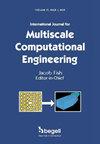利用基于机器学习算法的多尺度建模预测镁植入物的腐蚀情况
IF 1.4
4区 工程技术
Q2 ENGINEERING, MULTIDISCIPLINARY
International Journal for Multiscale Computational Engineering
Pub Date : 2023-12-01
DOI:10.1615/intjmultcompeng.2023050288
引用次数: 0
摘要
为了改善患者的治疗效果,减少与种植失败相关的社会和经济负担,持续的研究和开发至关重要。为此,在本研究中,已对镁植入物的腐蚀行为进行了预测。这包括植入材料、手术技术、感染预防策略以及考虑到每位患者独特特征的个性化医疗方法等方面的进步。最终,我们的目标是使骨科手术更安全、更有效。首要重点是尽量减少因腐蚀导致的植入失败等并发症,以提高患者的整体生活质量。骨科植入物周围的感染是植入物失效的主要原因。这些感染的治疗具有挑战性,因为植入物的存在会使人体免疫系统难以有效对抗感染。预防感染至关重要,通常需要在手术过程中进行严格的无菌操作。也可以预防性地使用抗生素。炎症是手术后的自然反应,但过度炎症会引起疼痛并导致并发症,包括植入失败。先进的材料和改良的手术技术可以降低无菌性松动的可能性。当种植体失效时,就必须进行翻修手术。种植体材料的选择是为了尽量减少腐蚀,但腐蚀仍然可能发生。腐蚀会导致种植体磨损和损坏,有可能引起炎症和种植体失效。外科医生和生产商不断寻求耐腐蚀性更好的材料。本文章由计算机程序翻译,如有差异,请以英文原文为准。
Corrosion Prediction of Mg Implant using Multiscale Modelling based on Machine Learning Algorithms
To improve patient outcomes and reduce the social and financial burdens associated with implant failure, ongoing research and development are essential. For that in this study, MLA has been done to predict the corrosion behavior of Mg implant. This includes advancements in implant materials, surgical techniques, infection prevention strategies, and personalized medicine approaches that consider each patient's unique characteristics. Ultimately, the goal is to make orthopedic surgery safer and more effective. The primary focus is to minimize complications like implant failure due to corrosion to enhance the overall quality of life for patients. Infections around orthopedic implants are a major cause of implant failure. These infections can be challenging to treat because the implant’s presence can make it difficult for the body’s immune system to effectively combat the infection. Preventing infection is crucial and often involves strict sterile procedures during surgery. Antibiotics may also be prescribed prophylactically. Inflammation is a natural response to surgery, but excessive inflammation can cause pain and lead to complications, including implant failure. Advanced materials and improved surgical techniques are designed to reduce the likelihood of aseptic loosening. When an implant fails, revision surgery becomes necessary. Implant materials are chosen to minimize corrosion, but it can still occur. Corrosion can lead to wear and damage to the implant, potentially causing inflammation and implant failure. Surgeons and manufacturers continually seek materials with improved resistance to corrosion.
求助全文
通过发布文献求助,成功后即可免费获取论文全文。
去求助
来源期刊
CiteScore
3.40
自引率
14.30%
发文量
44
审稿时长
>12 weeks
期刊介绍:
The aim of the journal is to advance the research and practice in diverse areas of Multiscale Computational Science and Engineering. The journal will publish original papers and educational articles of general value to the field that will bridge the gap between modeling, simulation and design of products based on multiscale principles. The scope of the journal includes papers concerned with bridging of physical scales, ranging from the atomic level to full scale products and problems involving multiple physical processes interacting at multiple spatial and temporal scales. The emerging areas of computational nanotechnology and computational biotechnology and computational energy sciences are of particular interest to the journal. The journal is intended to be of interest and use to researchers and practitioners in academic, governmental and industrial communities.

 求助内容:
求助内容: 应助结果提醒方式:
应助结果提醒方式:


